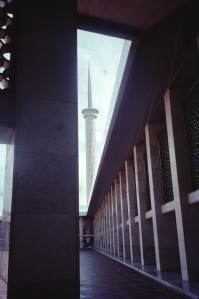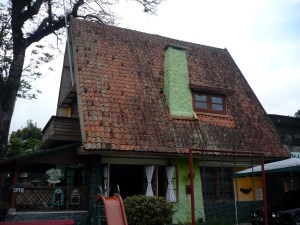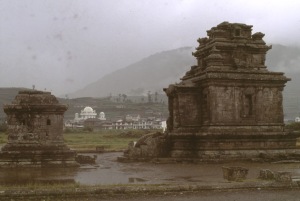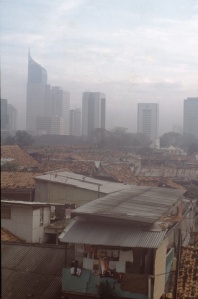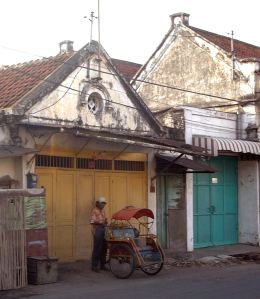(To read the series from the beginning go here )
I began this months ago. Readers of earlier segments will see the inevitable conclusion. Nothing that has occurred across the world since I began series has done anything but reinforced my sense that Islam is fatally flawed. So it’s time to finish, and fitting that I do so on another 9/11, as the reports of the Islamic invasion of Europe come in, towards the end of another year of escalating Islamic violence in nearly all quarters of the globe.
September 11, 2001
I had grabbed my coffee and turned on the computer. The start page was Yahoo. I took in the top headlines.
“Hey,” I called out to my older daughter,” somebody’s hacked Yahoo!”
No.
The older girl and I were now in Bandung, where she was in her junior year of high school. Suffice it to say that the radical move from the States had not produced much in the way of favorable outcome. Her mother and younger sister remained in Bali for a time, then returned to the U.S. Eventually we divorced. I had gone back to work, as an English instructor.
Stupefied, I went off to work, riding the public minibus. Indonesians are a gregarious lot, and regular commuters and and even one off riders will quickly strike up conversations. Today they were silent.
I was the only American at the school, and the British lady who ran the place, on learning I had family in New York and DC, let me call Stateside on the company dime. I was unable to get through anywhere (It’s parenthetical, but I cannot resist the near miss stories that so many of of us have. My sister worked in Midtown, but had a regular downtown meeting canceled that day; brother in the Pentagon had taken the day off to go to a daughter’s soccer game; and at the same time, most fortunate, but saddest, my NYFD cousin, a company commander, was off that day, and both towers had fallen by the time he got there.)
The minute I knew those headlines were real, I knew what kind of people had done it. There was no point hoping it wouldn’t be Muslims. This was after the East Africa embassies, the Khobar towers, the U.S.S. Cole, and others.
Al Qaeda wasn’t until that day a household name, but it was no secret.
Yet, aside from the school head, if you listened to the to other foreign staff that day, you’d have thought that America did it to itself. This was my first exposure up front and personal to the familiar litany: Israel, imperialism and oh yeah, Israel. Worse than their perfunctory and patently insincere expressions of sympathy that prefaced these diatribes was their manifest cowardice.
What would America do, they wailed, and how would it effect them there in Bandung? There was talk of sewing British and Australian flag patches on their clothes. This cravenness in the face of Islamic violence is drearily familiar now, but it was new to me then.
As the names of the hijackers came out, I was for putting some hurt to Saudi Arabia, but in the end we invaded Afghanistan, missed Bin Laden and later, invaded Iraq as well.
Shortly after the Bush ultimatum to the Taliban and the countdown to the invasion when they failed to produce Bin Laden, an army unit, with some APCs and light crew served weapons, showed up in my neighborhood, home to many foreigners and my daughter’s international school. The commander came to my door and assured me that he, his men, and the nation guaranteed my safety. This was quite refreshing after the reaction from my colleagues.
For many years, it’s been common for those in opposition to Islam, radical Islam, or jihad to say “I learned everything I needed to know abut Islam on 9/11. This was not the case for me.
Signs and Portents
Perhaps I had simply not looked around me until Islam was in the worldwide news, but the Increasing Islamization in Indonesia that I had noted over previous decades seemed to have accelerated.
Right away, there were Bin laden T-shirts for sale . A small boy wore one to my class and I sent him home. His parents complained and I found myself in a sit down with the mother – hijab – and father, dressed normally in Western clothes but with what looked like a fairly recent scraggle of chin beard.
I got an earful of how evil America was, but held my tongue, and explained that this had hurt people I knew, and nearly killed some of them.
We smiled, shook hands – well not the mother – and I went away with hate in my heart.
Which, in time, subsided.
I taught there for two years. Religion, I found, played a huge role in the young students’ lives. Ask “What’s the best book you’ve read” and the answers were the Bible, or the Koran, according to confession. I found such discussions mind-numbingly dull. However, Christians and Muslims seemed to get along well, and while many girls wore the hijab, they were not a majority.
The kids loved to hang out with their teachers, and one day during Ramadan, we went out for pizza. After a text message telling them the fast had lifted, we dug in. I’m not sure when I first heard the word Ramadan, the Muslim month of fasting, but in my childhood I have no memory of it being used, but instead the Malay, ”bulan puasa,” fasting month. Now it was ubiquitous, with special sales in the malls, deals on iftar(fast breaking) buffets, and Arabic music.
Bandung prides itself on being a university city, a place for the young, artistic and hip, and so it is. It was early oughts and “gap” was in style, with hip hugging jeans and bare tummies. Around the universities, one might even see coeds wearing a hijab but showing belly button.
Outside town, things changed quickly.
Early one morning, on the first day of Eid ul Adha, the Feast of Sacrifice, we drove out of town early., bound for Bali. The roads were jammed with people making their way to the mosques, torrents of them pouring in from the small villages up in the hills, thousands, all in Muslim dress. My daughter remarked that she didn’t remember this from previous years, and her boy friend, a life long resident, said he too thought that the crowds were far larger than before.
I had occasion in the next couple of years to take other trips across Java, and it was apparent that Islamic observance was far more strict than it had been when I had first traveled the island as a young man. Women working in the fields still wore the conical “coolie hats” that reflected an ancient migration from southern China, but now wore head scarves underneath, surely adding to the heat and discomfort.
Islamic schools and other institutions, with their Arabic signs, were in the smallest villages. One day, not far from the great Buddhist monument Borobudur, on a country road winding through the rice terraces, I came upon a sight I will never forget.
An open truck full of young men lumbered a long in front of me. They were waving banners, which said, “Front Anti-Yahudi,” the “Anti-Jewish front.” They wore once piece black costumes, painted with white skeletons, as if for Halloween. Waving, and cheering as I overtook, some then donned skull masks.
There, in the green valleys of Java, with the volcanoes rising to clear blue sky, scenery that had long inspired postcards and landscape painters, was raw hatred from the desert lands
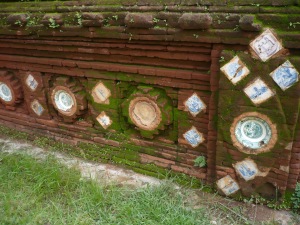
This wall in the former Sultan’s compound shows both Hindu-Javanese and Chinese decorative styles. Java has absorbed one culture after another, but will it survive Whaabbism?
I had left so many years before.
My daughter graduated and went back to the States; I moved to Jakarta,where there was better pay and considerably more fun. The old regime under Soeharto had kept Islamists under tight control, imprisoning, or outright snuffing any who looked to be a problem.
Now, the new president, not directly elected but voted in by a legislature that was put in place by clean elections, was all for letting people express themselves. While a Muslim himself and a cleric, he was a of a liberal cast of mind. Physically frail, and nearly blind, his “why can’t we all be friends” outlook(He spoke for a while of recognizing Israel) led him to myopia towards the forces being unleashed.
I taught at a school in a shopping office complex in Central Jakarta. There were plenty of nice restaurants and nightclubs nearby. Many of my classes were off site, at major businesses, and my students were well educated and well dressed. It was rare to see woman in a hijab.
Yet even in this milieu, I would at times catch a whiff of something going on. I remember our personnel manager, a married woman, very good looking, always in well fitted suits and heels, remarking that Bin Laden was “hebat,” an Indonesian word that in that context would be best translated as “bad ass.” There was considerable admiration for Saddam as well, but as in this was often in the context of tirades about American hegemony and regurgitated Chomsky, so chose not to see it in as related to religion.
On the streets, beyond the highrises, deeper trouble was brewing. An organization called
Front Pembela Islam(Islamic Defenders Front) took upon itself the role of a civil auxiliary in suppressing vice. They attacked night clubs and bars, starting out in the seamy dance clubs and semi-brothels of North Jakarta, where eventually the largely Chinese owners came to a modus vivendi in a protection racket that would be familiar to the Mafia, but then striking Kemang, home to diplomats, multinational executives, fine dining establishments and quite legitimate music clubs.
Nothing at all was done to stop them.
It was then that I saw a trend that has only continued. Radical Islamic elements push, engaging in mob action, while the civil apparatus of an ostensibly non-confessional state, not only does not punish offenders, but accommodates them.
Ramadan came, and for the first time, the City government decreed that late night venues must close early, and the sale of alcohol in such places was suspended during the fasting month. That this meant a month without paychecks for tens of thousands was of no import. Nor did anyone point to the underlying absurdity that alcohol and fornication are forbidden to Muslims at all times, not just one month in a year.
This attempt to put the city’s residents in a pious state of mind appropriate to the season lead to some quite absurd accommodations. The hot tub at my health club was drained, as apparently being in the water with ladies was an affront during Ramadan.
A popular hangout with a classical theme, put pasties on its faux-Greco-roman statuary. There, as at other places, the bar was cleared of bottles, but you could get some beer in a coffee mug. We grumbled that no good Muslim would be in such places anyway, so why couldn’t they just leave us alone.
As I was learn in the coming years, that wasn’t the point. Islamic behaviors, even practiced by unbelievers is an affront to Islam, as are the unbelievers themselves.
In late 2003, I went back to the States for a while, to work with my younger daughter on her college applications. I had left just after the Iraq War began, and I saw its effects when I was substitute teaching in Phoenix. Many kids were enlisting after graduation. They seemed to be disproportionately Hispanic, Black and Native American. Another war in the Middle East, anther conflict among Muslims, yet it still wasn’t something that would direct to me to examine Islam closely.
I was offered a job in Surabaya, East Java, where I stayed for seven years, where I again taught English, living with my partner, an Indonesian Chinese, and an atheist as I was. And am.
Surabaya is and has long been a center of industry and commerce, known as the “City of Work,” because largely that is what there is to do there. I had first seen it n 1970, when it remained a somewhat cobwebbed display of faded grandeur from the Dutch East Indies. Later in the decade, when I was working in Kalimantan, I often had occasion to come down to Surabaya to procure goods and services, and the place had clearly picked up. I dealt largely with Chinese businesses, and the Chinese are today still quite prominent in the city.
Yet, while it is in some ways fairly cosmopolitan, it fronts on a vast agrarian hinterland, and it is in these small towns an villages that the struggle between traditional syncretic Javanese religion, a meld of Islam and older beliefs, against Orthodox Islam, continues, after a very bloody start in 1965.
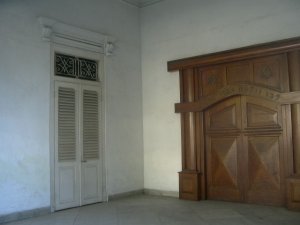
Synagogue, Surabaya, 2003. Long disused, but maintained with a grant from overseas, it was the site of demonstrations when anyone was angry at Israel. It has since been demolished.
This is a long stretch of time, and I could here provide a string of anecdotes to buttress my case, but I’ll instead provide a general outline of those years.
After 9/11, it was the consensus among Western governments that much of the problem was due to misunderstanding between cultures. Thus, a concerted effort was made to reach out, identify and select young Muslims for education in Western nations. Indonesia, bastion of “moderate” Islam was key to the program, and the school where I worked, was involved in many programs financed with American,British,Australian and New Zealand money
One day, we were warned to keep a low profile. Hizbut Tharir, a world wide organization( banned in UK, legal in the US) was demonstrating in favor a of a universal Caliphate. Completely covered women in black held up signs condemning the US and Israel, and demanding global Islamic rule.
In 2005,many of my students were in an uproar about Israel’s “Cast Lead” operation in Gaza. The world, I thought, has many examples of pain and oppression. Why was it that these young people, so far from the Middle East, were so concerned? And as I read more about Islam, and Islamic history, I came at last to the conclusion that the Arab Israel conflict was, in fact, the Islam-Israel conflict. Territory once Islamic, simply cannot be given over to non-believers, and that the Jews, reviled in the Koran and other foundational texts, had taken Muslim land was an affront past bearing.
I said nothing about these things, and if anything, were pleased with my knowledge of Islamic belief and practice. I wanted to be liked, and as my doubts grew, I still dissembled.
Yet the atrocities and violence across continents continued, never relenting.
Beslan.
The spin was “Chechen Nationalists,” nationalists who called, “Allahu akbar!”
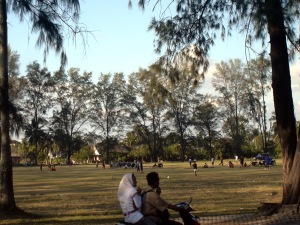
Soccer Field, Darussalam University, Aceh 2006. Since I was there, sharia has tightened, and unrelated men and women may not ride together, or be alone anywhere
For some years we had a large contingent of Achenese students, beneficiaries of study abroad programs established in the wake of the 2004 Tsunami. They were fine students, hard workers, but fun-loving, coming from a linguistic tradition that valued poetry and oration. It was, and still is a source of great pleasure for me to see how well they have done.
Still, all the women wore the hijab. The rebels let a few errant locks peep out. One fellow, a secret free thinker, was reduced to hiding when drinking coffee and having a smoke during Ramadan. At one point the program took me to Aceh to do some preparatory work with students before they came to Surabaya.
It wasn’t so bad. There was a lively coffee house scene, and it was common to see couples double dating. Of course, around ten, the boys would take their girl friends home, then come back and watch the footie. Rather charming, perhaps like small towns in America in bygone days
Outside town was a newly constructed governmental complex, and one large building was devoted to the administration of sharia law. It was not yet in force, but notices said it was coming. One would not need to be a forensic accountant to state that the building was at least in part paid for by the charitable citizens of the West who donated to tsunami relief.
Now, in Aceh, offenders are whipped publicly. Amputations and beheading have yet to arrive, but one wonders. A number of my students asked me to return to Aceh to attend weddings, but I am never going back.
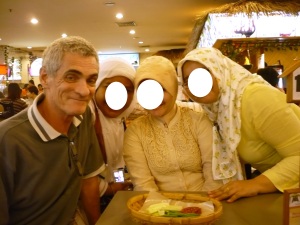
With some of my Aceh students, Surabaya, 2006. My late mother was astonished at this picture, as she had never herself seen Indonesia women so dressed.
Looking back, I can find no road to Damascus moment. I read the Koran, I various translations,learned about the hadith and the sira, delved deeply into the history of Islamic expansion, so that around2009, when I first started hearing of Boko Haram, I spoke of these matters one evening to my partner.
She asked, seriously, “are you an Islamophobe?”
I spoke of somewhat to what I have written here,and she began her own journey of discovery.
And my distaste only deepened. Sometimes people refused to sit next to me on the minibus I took to work everyday. Indonesians generally assume that foreigners don’t speak their language, but I understood the word, “najis,” unclean, as are all unbelievers. This did get me shotgun all by myself, where normally two passengers were crammed in.
I simply couldn’t take it anymore, so retired earlier than I had thought I would.
It’s been a little more than four years since I retired to Hindu Bali. I conceived of the project that became this “Encounters” series before I even got here. Yet I have tarried, and I tarry now,
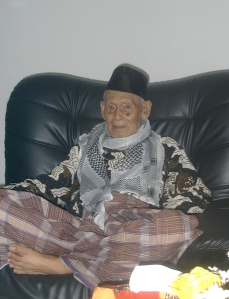
My father-in-law, the late Haji Kamal, 2005, Bandung. Dutch educated, civil servant in both the colonial and independent regimes, Nationalist Party activist, at the end of his life, besides his beloved coffee and cigarettes, there was only Islam.
Because in the end, I know the conclusion, and even after all these many years,it’s hard to just spit it out.
I’m done.
With Islam and with Muslims.
I’ll continue my study of the issues, and of course will be civil when meeting Muslims. I enjoy hearing from some of my former students. But as for all the efforts and blather at outreach, understanding, bridging the divide, and on, and on.
It’s useless.
This is to use a Marxist term, a world historical process. Islam is what it is. The Muslim Brotherhood, the Taliban, Al Qaeda, ISIS, this is Islamic reform.
Those who await some kind of Islamic Episcopalianism are fools. A millennial conflict will not be resolved by church suppers.
This is my stand. I have come to it through long experience and study. Others will make their own journeys of understanding, in their own way, in their own time.
Mine has ended.

